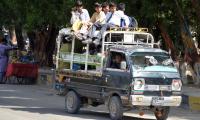Within two days, top industrialists and traders, including some of the most prominent names in the country, have met both COAS General Qamar Javed Bajwa and Prime Minister Imran Khan.
They have been very candid in putting forward their grievances stemming from a stagnant economy, a lack of profits, consequently a lack of reinvestment and their fear of NAB. They also spoke about their concerns regarding the National Accountability Bureau and its methods of operation.
In these meetings, we can sense at least a hint of panic if not complete desperation. Quite evidently, Imran Khan’s much repeated mantra to people to “remain calm” has had limited impact. He has however promised to deal with the issues raised by the business community with his entire economic team attending the meetings as well.
We should consider that if the most powerful men in the country are in such a state of anxiety, what must the situation of those who earn less be? The small traders, including vendors who face tough taxation, combined with rising prices; the household heads landed with utility bills from which subsidies have been completely removed on IMF orders; and the homemakers who witness a daily rise in the prices of even the most basic items such as atta, rice and sugar must be inevitably closer to panic on a far wider scale.
After all, with limited budgets, the decisions they must take involve either not taking a family member in for medical treatment because they can no longer manage it or changing a child’s school to one of lower quality because they have no choice. For others of course, as has already been discussed, there is simply no food at all to manage more than one meal a day. Hunger overtakes any panic they may feel.
Is this an acceptable situation for a government and its advisors to impose on its people? It is agreed that much of the fault lies with previous governments, their planning and their corruption. But there is no reason why common people should pay for these misdeeds. The task of government is indeed to put things right, but without damaging people so greatly that the economy teeters on the brink of collapse and ordinary people wonder how to balance their budgets. Inevitably, it is women who bear the biggest burden, trying to cook on extremely low expenses and feed children who demand more.
It is absolutely true that corruption should not be tolerated in any society. But in cleaning up corruption, there must be justice. At present, people are at the very least uncertain or else convinced that this simply does not exist. The LNG case in which former prime minister Shahid Khaqan Abbasi, Miftah Ismail and the CEO of the LNG terminal Sheikh Imran ul Haq have been arrested is one that has created multiple queries and questions.
There has been much discussion of the technical details – but all three men are said to have excellent reputations and as yet no definite evidence has surfaced that they had done anything that was deliberately intended to hurt the country’s interests. And can possible misjudgments or errors be ranked on the same tier as corruption? Others, who many in the business community believe are guilty of bigger offences, appear to have escaped altogether, and the extent of pressure placed by NAB on traders, retailers, shop owners and ordinary citizens has created a wave of fear which is not conducive to either development or economic growth.
Given IMF dictates, there are of course limited options before the government. But from the cage it finds itself trapped in, it must conjure up a little bit of magic. In dire situations, this is needed. Imran Khan should remember how such spells of virtually supernatural bowling or a similar innings at the crease by one individual or the other, including himself, changed the course of an entire game. It is something like this that we need. We also need the innovation and intelligence to come up with it.
There are for now limited signs that the cabinet possesses this ability as a collective body. The rumours that the cabinet will soon be reshuffled once again give us even less confidence. Yes, perhaps in some imaginary ways running a government is like controlling a cricket team. But in reality, this is not quite the case. A change in the batting order will not rescue us from our plight. The issue is not who to send at number four and who to send in as opener, or whether to elect three spinners or three, but on devising major policies and laying out a longer term direction for the government. This takes expertise.
There is some question as to whether sufficient expertise is available. Changing the same faces around will not produce it. Instead, a major rethink is need, bringing in persons, including if necessary those who sit on opposition benches, for a discussion on the state of the country, the problems faced by it including pressure from the FATF and other problems.
To bring about major change, the support of the people is almost always essential. This has been seen in countries across the globe for decades. Whether a policy is one that is in orientation left-leaning or fascist, when people support it, it becomes easier to implement. The examples of Evo Morales, Narendra Modi and before them men like Jyoti Basu etc all stand out. Whether for good or for evil, these men and women all achieved this popularity.
To gain it, Imran Khan will need to move beyond the fading sphere of popularity he still has from die-hard PTI supporters. There are many in the country who voted for him and his team in the very real hope that change would come. The dreams of people deserve not to be destroyed. To achieve this, people need to be given what they need most.
In the present circumstances, what is needed is alleviating hunger, at the very least among children, by offering school meals rather than handing out burqas to girls at institutions in Khyber Pakhtunkhwa, improving the situation at government hospitals (KP doctors are already up in arms against some government policies) and creating some kind of social welfare net at least for those caught in an entirely dire situation at the very bottom of the poverty pyramid. The government has admitted it lacks liquidity, that it lacks resources. This is an honest statement of their situation.
The plans of Imran Khan, made before the elections to overcome issues by bringing back money stolen from the country or persuading overseas Pakistanis to remit more money, have proved to be nearly impossible. His own government has said recovering corruption money is unachievable. So, other plans have to be found which involve the people directly before they lose all hope and sink into a further state of panic possibly leading to anarchy.
The writer is a freelance columnist and former newspaper editor.
Email: kamilahyat@hotmail.com
A health worker administers polio vaccine drops to a child during a door-to-door polio vaccination campaign in Lahore,...
Armed militants of the banned Tehreek-e-Taliban Pakistan pose for a photograph in Orakzai Agency. —...
An aeroplane of the national flag carrier of Pakistan is seen in this file photo. — AFPWhile Pakistan considers...
Representational image of a graph depicting various variables. — APP/FileInitiated by the centre and fiercely...
In this picture taken on April 16, 2023, people throng a market area during shopping in Lahore. — AFPOne of the...
Honour crimes also target men. In Sikandar Ali Lashari vs The State, SHC upheld conviction passed by ATC for honour...







